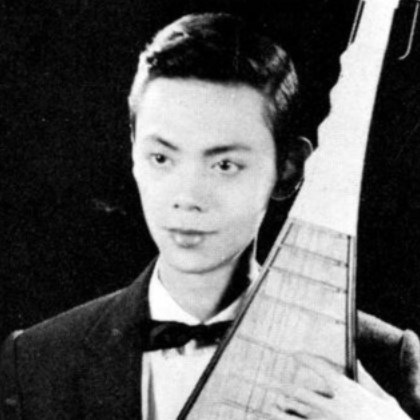Lv Zhenyuan

Lv Zhenyuan was originally a teacher at the University of California, where he taught Chinese music in the school's "Department of Ethnic Music". He organized a team of Chinese Chinese Orchestras at the school, divided into senior and junior groups. Each team has about 20 members, including some American students and Chinese students play a variety of Chinese musical instruments, such as erhu, dahu, xiao, flute and gongs and drums. As for the musical instruments, they are all shipped from Taiwan or Hong Kong.
He said that the main purpose of organizing this Chinese orchestra is to promote Chinese music and make foreign students have a better understanding of Chinese music.
American students learn Chinese musical instruments. Lv Zhenyuan explained that American students think it is a kind of knowledge. Learning Chinese musical instruments can enrich their knowledge and improve their understanding of Chinese culture. There are many experts abroad who specialize in Chinese literature and art.
Oriental music is generally welcomed in the United States. Although the style of Chinese music and the structure of instruments are far from their own, they can always appreciate something through music—music can break the categories of language and characters. The spirit of music and emotional resonance, they especially appreciate the mysterious color of oriental music.
The Chinese music performer also said: Generally speaking, foreigners prefer tones with clear melody and strong contrast in sound, which are easily accepted by them. Therefore, his own work "Military Music Exercise" attracted much attention. interest of many foreigners. Among pipa and guqin, Americans like to learn guqin, and at the same time appreciate guqin, because learning pipa is more difficult than guqin.
He also pointed out that in the Tang Dynasty, the notation of guqin was written notation, and a short piece of music had to be written into a long article. Later, after being shortened to the method of square Chinese characters, this kind of piano score has not been changed for hundreds of years. Therefore, foreigners will inevitably find it difficult to learn, but Lv Zhenyuan believes that this notation method is not necessary to improve and simple, and it can completely retain the ancient flavor, which is more valuable.
Lv Zhenyuan began to learn to play Chinese musical instruments at the age of ten, and was especially interested in playing the pipa and the guqin. After he moved from Shanghai to Hong Kong, he held recitals and played on the radio. Lu Zhenyuan left Hong Kong in 1957 to perform in Sao Paulo, Brazil, and then moved to the United States.
After arriving in England in 1959, he made his first lute performance at Carnegie Hall in New York, which was well received by The New York Times and the Herald Tribune. The BBC immediately invited him to London for radio and television performances, and the Paris Television Company also invited him to perform, which was welcomed by countless Chinese and foreigners.
After returning to the United States, he performed in major cities and famous universities, such as Harvard, Yale, Columbia and Stanford, to promote Chinese traditional music. In 1961, he was hired to teach Chinese musical instruments at the University of California.
He said that the Department of Ethnic Music at UC has a wide range of subjects. In addition to Chinese music, it also includes music from Japan, music from Indonesia, India, Africa, Mexico, the Philippines and the Middle East. Even students who are not majoring in the Department of Ethnic Music are also required to choose music from two regions as a compulsory subject of "Music Appreciation".
Lv Zhenyuan felt very sorry for the lack of Chinese traditional music performers in the United States. He pointed out that Japanese music is more widely used in the United States than Chinese music, because there are more Japanese musicians than Chinese music, and the music is originally the music of the Tang Dynasty in my country. It only spread to Japan, but it was lost in our country. However, foreigners, regardless of Japan or China, collectively refer to them as Oriental music.
In addition to playing pipa and guqin, Lv Zhenyuan also composed some pipa solos, including "Military Music Exercise", which is very popular among foreigners, and "Flowing Water", "Candlelight", "Dragon Boat" and so on.
"Candlelight" will bring new eyes and ears to the audience. It can be regarded as a new work of the avant-garde. It is Chinese pipa music created by using the Western organization method. His motivation for writing this piece of music is entirely because Influenced by Western music.
He is currently writing a book about the pipa in English, so that more foreigners can understand the structure, history, timbre, works and playing methods of the Chinese pipa.
During his stay in Hong Kong, he played the pipa at the invitation of Lai's Yingsheng Chinese TV station, and recorded a solo record for EMI Records. The record company invited two solo records for lute and guqin.
Lu Zhenyuan was amazed at how much Hong Kong has changed in the past ten years. He will leave Hong Kong on September 15 and go to Taiwan to perform. Then I will go to Tokyo to play again. It is expected that after performing at the University of Hawaii on October 4, I must return to the University of California before October 9 to start classes.
Lu Zhenyuan, who has been away from Hong Kong for ten years, apart from visiting relatives and friends, will hold a Chinese music concert with his younger brother Lu Peiyuan on September 10 at the Town Hall to meet with local Chinese music-loving audiences and students.
Similar artist
Involving musical instruments
Involved portfolio
Involved news
Popular artists
- 01 Zhang Xiuyan
- 02 Chen Tao
- 03 Li Muliang
- 04 Zhu Changyao
- 05 Zhang Gaoxiang
 渝公网安备 50010702504639号
渝公网安备 50010702504639号